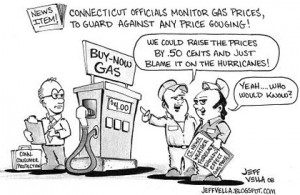 Price gouging is often defined as charging very high prices for products and items that are in high demand in market. A large part of society believes that price gouging is greedy and should be illegal. Is it unjust and unethical for price gouging to occur, especially after a natural disaster? Or does price gouging ultimately lead to a positive result?
Price gouging is often defined as charging very high prices for products and items that are in high demand in market. A large part of society believes that price gouging is greedy and should be illegal. Is it unjust and unethical for price gouging to occur, especially after a natural disaster? Or does price gouging ultimately lead to a positive result?
Many places have issued an anti-gouging law which states that people are not allowed to gouge in markets. However, economists look at this issue of price gouging very differently. They disregard the emotional aspect of price gouging and simply look at how it is best for society. Gouging is simply the market at work, guided by the invisible hand and can lead to a greater good.
Imagine a town that has just been struck by a hurricane and there is a need for flashlights. There is only one store that sells flashlights after the disaster. If anti-gouging laws were in effect, anyone can go and buy the flashlight, no matter how intense or valid their reason for purchasing is. Therefore, the flashlight supply will run out quickly and becomes a “first come, first serve” basis. This will limit people who actually need flashlights to survive to purchase one. However, if gouging was allowed, the consumers that view flashlights as a necessity will be willing to spend a lot of money to obtain it.
Gouging helps distribute scarce goods to those who need them most. The anti-gouging laws interfere with the invisible hand as it guides the free market. Do you believe that gouging is a positive impact on markets? Is it unethical?
Here’s a link to a video podcast regarding the price gouging issue: http://www.cbc.ca/player/Radio/More+Shows/The+Invisible+Hand/ID/2250922676/
Figure 1: http://www.ctnewsjunkie.com/ctnj.php/archives/entry/price_gouging/
